Frequencies and exams always bring some anxiety, which can affect your final grades. For this reason, it is essential to find study techniques that increase performance and put you on the right path towards your goals.
Although some of us think that in order to get good grades we have to study intensively, many studies prove that this is a myth. The decisive factor for obtaining good results is not the quantity, but the quality. The truth is that highly successful students spend less time studying than their colleagues who spend hours immersed in books – just because they study more efficiently.
Study techniques: study more efficiently
In this age of social media – and countless digital distractions – many students become very good at “multitasking”. But, unfortunately, as a general rule, there are no successful multitasks, because much of the time spent is wasted on changing contexts, where the brain needs to restart and concentrate again.
Consider this formula: intensity of focus X time spent = work done. A student who studies for the chair of Biology, but also takes breaks to study Algebra in between and still scrolls through Instagram every 15 minutes, has a low intensity of focus. Although they had 3 hours of study time, the performance was poor.
On the other hand, a student who allocates 1 specific hour to study only Biology, free from distractions, has an excellent focus. Although he spends only 1 hour studying, he achieves more than his (distracted) colleague in 3 hours.
Successful students generally shy away from multitask. Instead of spending a lot of time doing low-intensity work with countless distractions, they work for shorter periods and with greater intensity, with no distractions around – that includes their smartphone. Their study is thus more effective and translates into truly satisfactory results.
So that you can meet your goals and get good grades, while enjoying moments with your friends and the must-see attractions in Lisbon, we have prepared for you 7 infallible studio techniques that you will want to know. You will realise that it is not so much the time you use, but what you do with it.
1. Organise your schedule
It is not by chance that this is the first study technique. Having an organised schedule is the first step to staying focused and thus achieving your goals.
On Saturday morning or Sunday night, plan your week. Allocate hours for the study of each discipline and plan how long you need to complete it. Before going to sleep every night, review the next day’s schedule. Waking up to a plan will make you more productive and motivated.
2. Perform pre-tests
Practicing questions and answers before learning the subject, even if the answers are incorrect, automatically improves your learning. Studies show that pre-tests improve post-test results more than spending the same amount of time studying.
3. Create intervals between sessions
Spacing the study sessions, studying a single subject – from a single course unit at a time – for a short period of time, on different days, significantly improves the way you assimilate the contents.
4. Take time for yourself
Our brain is a muscle, and like any muscle, it also gets tired. Therefore, in order to make the most of your study hours, it is important that you take breaks. Take the opportunity to read your favorite book, to go for a walk or run and to be with the people you care about. If you are lucky enough to live in a university residence in Lisbon, like Collegiate, take the opportunity to enjoy its living areas, perfect to rest and disconnect completely. When you return to the study, you will see how everything flows naturally. Breaks are essential!
5. Make mind maps
Map creations can help you understand and decorate the material, especially if you have a good visual memory. Use free tools like Mindmanager or Xmind and structure the material with balloons, braces, arrows and different colors to make it easier to organise ideas, distinguish content and memorise the material.
6. Paraphrase and reflect
Many of us read a few paragraphs from a book just to realise that we have not assimilated a single concept or key point presented. To combat this, use intentional learning strategies. That is, relate what you are reading and learning at the moment with what you have read and learned previously.
7. Pretend
Research shows that students are better able to memorise and remember when they learn new information with the expectation of teaching it to others. Which makes a lot of sense, since teachers are in charge of not only learning the information for themselves, but also organising the main elements of that information so that they can then explain it clearly to others. When you feel more committed to the subject – because you will have to explain it to someone – you will instinctively look for methods of remembering and organising, which can be especially effective.
We hope that these study techniques will work with you and that you will be able to achieve everything you aspire to in your new stage. 🙂








